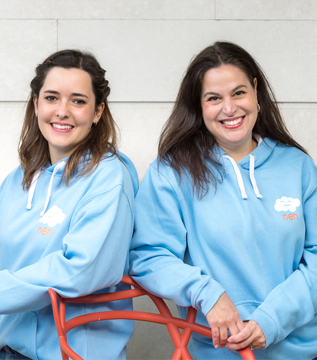
Article
How nen DTx Will Help Kids with Cancer to Manage Pain
This post was previously on the Pathfinder Software site. Pathfinder Software changed its name to Orthogonal in 2016. Read more.
We asked Tina Wallman, Entrepreneur in Residence for UnitedHealth Group’s Innovation R&D group to write a guest post with her perspective on the space:

Last year, UnitedHealth Group’s Innovation and R&D Group embarked on a journey with Orthogonal to find out if the lessons of lean startup can be applied at a $100 Billion company in a highly regulated industry.
In big business, innovation often encounters unique obstacles and challenges, but UnitedHealth is working to create a culture of innovation for its employees. As an Entrepreneur in Residence for UnitedHealth Group’s Innovation R&D group, I’ve been able to see firsthand how focusing on innovation and change can positively affect big business – all the way up to the leadership level.
At UHG, the Innovation R&D group, a small subgroup of people, acts as an internal accelerator that spins up new healthcare products and services. The idea to create a subgroup was, in itself, innovating. In a typical work group, we talk about innovation and try to find ways to do it, but trying to innovate on top in addition to the responsibilities of a full-time job can negatively impact the time you have to implement concepts successfully. Creating an innovation-focused subgroup within the company that’s part of an employee’s actual job allows them the time to play outside of the normal space and be off the grid while at work.
Right now, I’m working on my fourth innovation concept for UHG. Even though we decided to not move forward with the three previous concepts, as a company, we learned a lot from this process. Historically, big companies are not always good at shutting down concepts, even when quantitative and qualitative data show an unfavorable response. It’s far better to stop focusing on and investing money in unhelpful ideas and to start moving forward with other concepts quickly. It was a huge win for us to be able to do that since we had valid reasons to stop pursuing our first three concepts.
Some really cool ideas are in the works at UHG. I can’t share too much right now, but we definitely are going outside of the box a little bit. One of our challenges is that healthcare is a very heavily regulated area. We’re trying to be creative, to figure out how we can learn from and use concepts from less regulated industries and apply them to the healthcare industry.
From the beginning, we’ve used the Lean methodology at UHG. For the most part, it’s been easy to implement with this subgroup and our Entrepreneurs in Residence. It’s challenging at times, but once you understand the methodology, Lean makes it a lot easier to quickly assess where you are in the process of a development concept. Additionally, the methodology allows you to go back and re-examine different stages of the process when you encounter issues.
Lean also makes it easier to understand where you are, what the process is and what you need to do in that framework. As an entrepreneur, you still have the flexibility to move around, but you have a very solid foundation structure.
As is always the case, the innovation team has seen its fair share of challenges, but we’re focused on turning challenges into victories for the company. Understanding that failure is still a success – in the sense that you have proven that the concept either doesn’t have a market, doesn’t have the revenue stream that you thought it would, or just that’s it’s too early – is a valuable lesson we’ve been able to take away from this process and bring to the leadership team. Now we don’t see results like these as “failures.”
Having our executives embrace our closed projects as successes was a huge victory. It allowed us to shut down projects and refocus our energy on other projects that yielded more favorable outputs. This wasn’t something our leadership had ever tried, but over time we were able to change their mindset. Now, leadership looks to our group to evaluate innovation as a core capability. It is really important for us to be able to vet ideas quickly and let leadership know whether we should shut them down or continue moving forward.
The culture of innovation is fun – and a little different in the healthcare arena. Realistically, our startups are going to take a little bit longer to get to market, but they’re going to be more all-encompassing because they need to benefit more than one healthcare niche.
We look to develop concepts holistically, across multiple segments in healthcare, in order to provide a product that incorporates many different aspects. This is hard to do correctly and to get into the marketplace. What’s great about this is that UHG has really embraced us, allowing us to access different areas of the company to gain feedback and share what we’ve learned.
Although our main goal is to create innovative products and services for the healthcare industry, everyone in the company has benefitted from an unexpected side effect of our actions. Our teams and groups are sharing experiences and ideas with each other more and more. Many of our groups don’t get a chance to go outside the four walls of the company. But now, we bring our experiences and external feedback in, and that’s being embraced. It’s also been great for us as entrepreneurs, because now we can talk to a wide range of people in the community and share what we’ve learned in UHG groups.
It’s wonderful to receive such support from UHG executives – to be able to explain what we’ve learned and have leadership respond positively. This new mindset has, in turn, created a quicker way for us to validate what we should be working on, and how much we should be investing in certain projects. UHG’s shift in mindset, and their embrace of innovation will continue to help our company grow and develop in ways that benefit everyone involved.
Here’s a talk by Kunjorn Chambundabongse (KC) describing UHG’s Innovation R&D group use of Lean Startup methodology.
Related Posts

Article
How nen DTx Will Help Kids with Cancer to Manage Pain

Article
How Industry Experience Shaped Creation of DTx Startup nen

Article
A Conversation with Eric Ries at the Chicago Lean Startup Circle

Article
Faster Feedback Before Development Starts: Feasibility